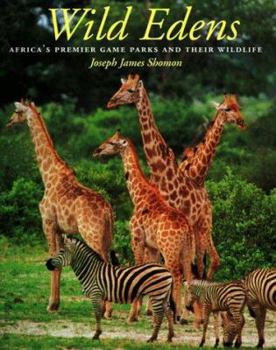Wild Edens: Africa's Premier Game Parks and Their Wildlife
(Part of the Louise Lindsey Merrick Natural Environment Series Series)
Africa's great game parks house thousands of the world's most incredible wildlife, including the elephant, rhino, zebra, and gorilla, but along with this beauty comes a desperate struggle for existence. This living legacy faces the possibility of becoming extinct because of ignorance and apathy. In Wild Edens : Africa's Premier Game Parks and Their Wildlife , longtime conservationist and seasoned African travelerJoseph James Shomon journeys through the wild African scene, revealing its magnificence and mystique, and wonderfully describes the game parks' location, ecology, and irreplaceable wildlife. From the summit of Kilimanjaro, Africa's highest mountain, the author surveys the marvelous Edens of East Africa, among the last Pleistocene-like concentrations of animals left in the world today. Descending, Shomon gives a firsthand account of the great sanctuaries, providing a knowledgeable escort on safari in the scrublands of Tsavo, where elephants are imperiled. He continues on to the Ark at Aberdares, where visitors can watch, under floodlights of a watchtower, rain forest animals come to feed; to the rain forests of Mount Kenya; and to the Serengeti and Mara Plains, with their great migrating herds besieged by predators and thwarted in their journeys by swollen rivers and flooded lakes. The journey continues through the Great Rift Valley and Olduvai Gorge to Lake Manyara with its tree-climbing lions; Ngorongoro Crater; Samburu and Meru, where the rhino is threatened; the waterways of Uganda; the Mountains of the Moon; the Kalahari Desert; and the wildlife sanctuaries of South Africa, ending the tour at the Cape of Good Hope. Shomon argues that the plethora of impersonal technology and excessive mechanization, as well as the world's focus on violence, social ills, and discord on our domestic front, consume the world's energies, leaving little interest for safeguarding and conserving Africa's wild edens. Shomon's engaging and informative text, complemented with attractive photographs and pen-and-ink drawings, encourages those interested in Africa and its wildlife to visit the cradle of our ancestral beginnings and to take an active role in its preservation and conservation.
Format:Hardcover
Language:English
ISBN:0890968012
ISBN13:9780890968017
Release Date:September 1998
Publisher:Texas A&M University Press
Length:288 Pages
Weight:1.85 lbs.
Dimensions:0.7" x 8.7" x 10.8"
Customer Reviews
1 rating
A different book on wild life....
Published by Thriftbooks.com User , 26 years ago
Wild Edens. Africa's Premier Game Parks and Their Wildlife, by Joseph James ShomonIt was our pleasant experience to read an extraordinary book! Although lacking in graphics, we do consider this one much richer in content than the more familiar, photo-laden publications covering this subject.Wild Edens has a very well written, interesting and varied text. The author combines skill with expert knowledge in different areas, i.e., ecology, geography, history and zoology, giving the reader a complete picture of these most important African National Parks. In Appendix 1, a short essay about David Livingstone and his pioneering disclosure of central Africa, is well worth reading.Appendix 2, with its complete list of the parks, gives very useful information to readers planning to be visitors.An outstanding description of the killing of a buffalo by a pack of hyenas in Aberdares Park is most impressive (Chapter 3). The reader feels strong sensations while witnessing the "cruelty" of the natural world and the tense relations between hunters and the hunted, in nature's domain.Because this is a book of major interest and value, we find it unusual to discover a gross mistake...The legend of the colour photograph depicting a zebra and two baboons at Jane Goodall's camp near Lake Tanganika (see colour photographs next to pg. 80, with a similar photo on the back cover). It reads: "Zebra and chimpanzees"... It is clear that the photographed monkeys are not chimps (Pan Troglodites), but baboons (Papio Cynocephalus). Zebras and baboons have the same habitat, ` savanna', while, typically, chimpanzees live in a forest. It would be rare for the two breeds, zebra and chimp, to meet in the wild ... their habitats being so positively different. How an error such as this could have been overlooked by such a competent author is disconcerting. However, this oversight certainly does not, in any other way, jeopardize the special value of a "different" book on wild life.José Xavier de Basto Coimbra, Portugal with Jacqueline Martin Texas, USA





